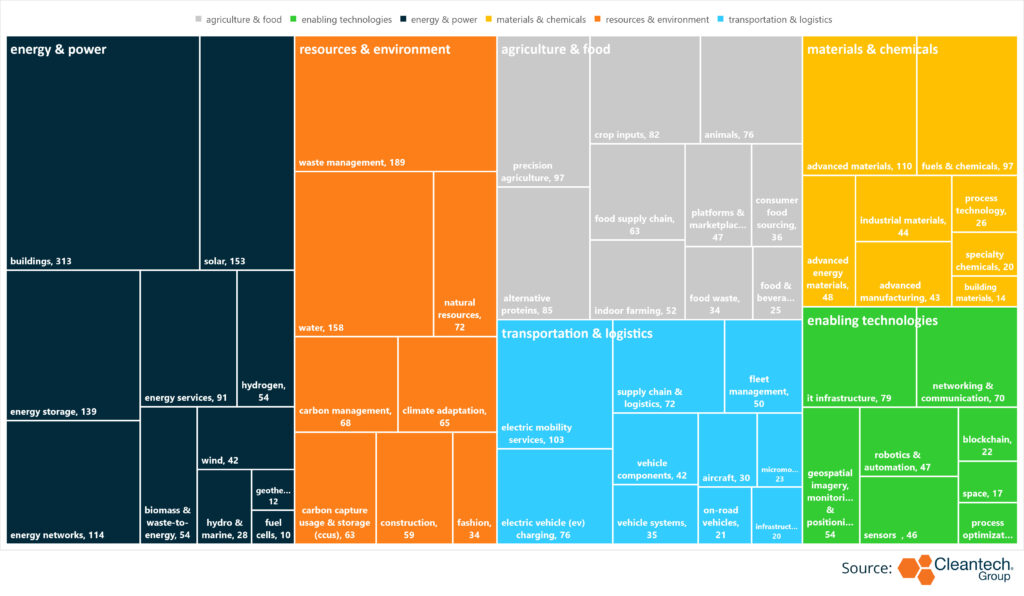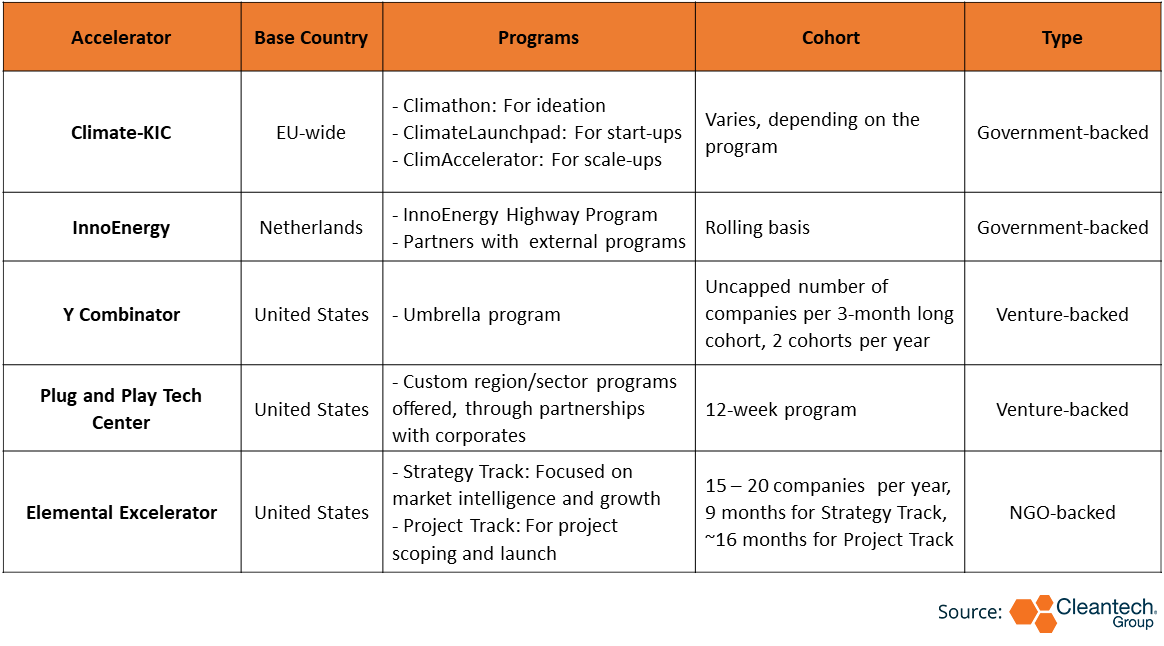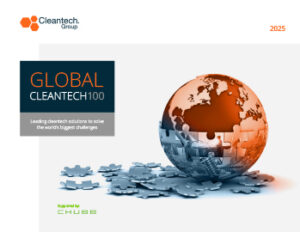Accelerating Cleantech Innovation: How Accelerators Drive Sustainable Change
Accelerators are a crucial component of cleantech innovation ecosystems. They support early-stage start-ups to bring their solutions to market, providing mentorship, resources, and networking opportunities to founding teams.
Themed accelerators may also target the most pressing climate needs, equipping start-ups to tackle the issues by developing industry-specific knowledge and expertise. Venture builders often go one step further, by proactively identifying gaps and assembling founding teams to build and accelerate a company that solves a particular climate issue.
Cleantech Group’s research shows that the presence of cleantech-specialist accelerators in a city or region is often correlated with an increased concentration of start-ups. And because entry to accelerator programs is often competitive, the best accelerators signal start-up quality to the rest of the ecosystem, increasing a start-up’s chances of obtaining follow-on funding and early customers.
Finally, accelerators often contribute to building a local community of cleantech innovators and entrepreneurs, not only fostering a culture of collaboration, but also working to address specific regional and global issues.
Our i3 database tracks cleantech start-ups and other ecosystem actors globally. We analyzed the sector focus of 535 specialist cleantech accelerators worldwide to understand the hot topics that they are currently addressing.
Cohort Companies of Key Cleantech Accelerators by Primary Sector

The major sectoral themes globally are:
- Buildings (including HVAC, energy management, and retrofitting)
- Waste management
- Water (including potable water and wastewater treatment)
- Solar
- Energy storage
- Energy networks (including DER management and grid management)
- Advanced materials
- Electric mobility services (including micromobility and ride sharing)
These vary by region and country, as accelerators venture to identify and address immediate challenges in their ecosystem. They also consider the demand for solutions from local corporates and municipalities.
Accelerators May be Independently Operated or Backed by Other Ecosystem Actors
The underlying model for most accelerators is cohort-based, with structured offerings over a fixed period. The 3 main types of accelerators are:
- Venture-backed. Their goal is to gain profits through equity-based investing, typically focusing on supporting early-stage start-ups in their growth and development.
- Corporate-backed. These aim to foster external innovation, with a goal to integrate within their own business.
- Government/NGO-backed. Their target is to enable regional/national innovation and address challenges faced. These can be non-profit, working with support from NGOs/governments, and/or have an investment-based revenue model.
In addition, accelerators can offer expertise in commercialization or innovation that is specific to the sector, and this knowledge can be valuable to other entities in the ecosystem beyond start-ups and small- to medium-sized enterprises (SMEs). Because entry to a program is usually competitive, accelerators with a good record of accomplishment also serve as a guarantee of quality to early-stage investors.
Examples of Leading Accelerators That Drive Sustainable Innovation
We analyzed accelerators across the world and listed some examples of successful accelerators with a cleantech focus below.
Y Combinator is a U.S.-based startup accelerator that runs two venture-backed programs per year and provides resources, mentorship, and funding to early-stage start-ups. Each selected company gets $500,000 in funding and participates in a 3-month-long program cycle. The program includes “office hours” and weekly meetups that feature special guests from the Silicon Valley ecosystem. The program ends with a Demo Day that serves as a platform for showcasing startups to selected investors and press. Since 2005, Y Combinator has funded 3,000+ companies of which over 100 are climate tech start-ups that together are worth over $10B.
EIT InnoEnergy serves as an example of a government-backed accelerator with a goal to bridge the gap between research and commercialization of sustainable energy technologies across Europe. It operates as a public-private partnership between the European Union, leading universities, research institutions, and industry partners. EIT InnoEnergy offers a range of services to support entrepreneurs, including funding, business development, market analysis, and access to a network of industry experts. The compnay also provides education and training programs for students and professionals in the field of sustainable energy.
An example of a corporate-backed accelerator is Low-Carbon Hydrogen Accelerator, managed by Greentown Labs and Urban Future Lab. The program is sponsored by Shell and EPRI, to drive innovation in, and commercialization of, low-carbon hydrogen. The corporate partners provide access to their facilities, piloting and testing capabilities, expertise, and global customer base. Funding opportunities are also available for start-ups taking part in this program through Shell Ventures and Shell Gamechanger.
Top 5 Accelerators With Cleantech Programs Globally, by Number of Portfolio Companies

Six Ways That Accelerators Add Value to Cleantech Innovation Ecosystems
The best accelerators offer more than just programs. Below are six examples of cleantech accelerators which work to maximize success of their cohorts while contributing to the wider cleantech innovation ecosystem.
Beamline Accelerator (Estonia) engages national policymakers, providing sector-specific expertise and data on cleantech innovation needs, such as capital requirements and regulatory issues. This has contributed to securing additional support for cleantech innovation and a more supportive regulatory environment.
TechX (United Kingdom) is part of Aberdeen’s Net Zero Technology Centre, running 15-week Clean Energy Accelerator programs for cohorts of 12 start-ups. Two places in each cohort go to start-ups who are created proactively in partnership with venture builder, Deep Science Ventures, to meet innovation needs which are not currently being fulfilled by existing start-ups.
Rockstart (Netherlands) holds ecosystem days where different organizations come together to watch graduating start-ups pitch their solutions. These events bring together early- and later-stage VC investors, helping to create synergies and pique interest with potential follow-on funders.
Plug and Play Tech Center (Global) collaborates with the Alliance to End Plastic Waste on the End Plastic Waste Innovation Platform, which aims to end plastic waste across the entire value chain. The program has accelerated start-ups across nine locations and resulted in $170M in capital deployment. Moreover, the Alliance and its member companies have made many meaningful partnerships with participating start-ups that resulted in such projects as replacing fossil fuels with recycled material or diverting over 1 million pounds of waste over 4 cities.
RBC Women in Cleantech Accelerator (Canada), powered by MaRS, promotes women-led businesses by supporting women cleantech entrepreneurs to scale their technologies. Female entrepreneurs join a tailored two-year incubation program at a private innovation support organization. According to participants, one of the main advantages of taking part in the program is the “cohort” effect (the bond among them), an advantage enabled by the program design, which includes in-person events and training for a small group of early-stage start-ups at similar stages of development. Moreover, the shared experience of all being women facing related and often underappreciated challenges contributes to its effectiveness. Participants anticipate that they will continue to exchange challenges, experiences, and opportunities with one another even after the program concludes.
Cleantech Open (USA), is one of the world’s largest cleantech accelerators, operating since 2005. Cleantech Open works with start-ups to develop their business models, engage investors and secure first customers. Start-ups accelerated by Cleantech Open have collectively raised over $2B in external funding. Cleantech Open has a strong network of mentors, investors, and industry partners who can provide guidance, resources, and connections to startups. Their mentorship program deploys mentors representing multiple skillsets and industries who give the start-ups regular feedback and encourage them to think about their business in new ways.
These examples highlight different ways that accelerators contribute to the cleantech ecosystem and help to drive innovation and growth in this sector.



